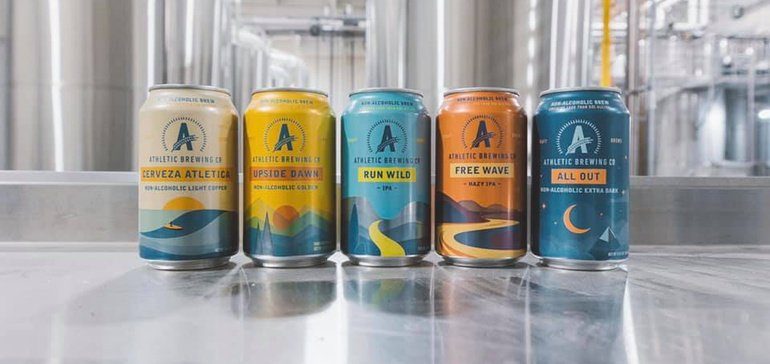Nonalcoholic beer maker Athletic Brewing raises $50M

Dive Brief:
- Nonalcoholic beer maker Athletic Brewing has raised a $50 million Series C funding round led by Alliance Consumer Growth and existing investor TRB Advisors. This brings Athletic’s total funding to $70 million, co-founder and CEO Bill Shufelt told Food Dive.
- It will use the funding to construct its third brewery, a manufacturing facility in Connecticut, to support East Coast expansion. Athletic Brewing used its first funding round to build its first brewery, and its second to purchase a facility in San Diego, California, in 2020.
- Athletic is seeing “a surge in consumer demand and we’re really hard pressed to meet [it] currently, so we’re trying to lay for bricks for the future,” Shufelt said, pointing to Nielsen data showing that sales of nonalcoholic craft beer have grown 430% year-over-year, with Athletic claiming half of the segment. Consumers are increasingly opting for nonalcoholic beverages as part of a larger interest in health and wellness.
Dive Insight:
Whether they want to cut their calorie and sugar consumption or hope to avoid a hangover, consumers are showing that a buzz isn’t necessarily what a beer is about anymore. Demand has exploded, with sales of nonalcoholic beer up 230% since 2018 when Athletic launched, according to Nielsen data cited by Shufelt.
The roughly 40,000 barrels of beer that Athletic produced last year were not enough to keep pace with demand, Shufelt told Food Dive. But this is not a new problem for the brewer, which has encountered trouble with production capacity since it was founded.
“We’ve been shorting orders for years, unfortunately, [we are] quite frequently out of stock on our ecommerce site, and have had significant shortages on distributed orders too, so it’s definitely responding to a surge in category demand,” Shufelt said. The company offers a range of nonalcoholic beers, including IPAs, stouts and sours, as well as hops-infused flavored seltzers.
Athletic Brewing has worked to set itself apart through its sponsorship of and partnerships with sporting events such as the Ironman Global Series, and lining up athlete investors including Lance Armstrong and NFL players Justin Tuck and J.J. Watt.
The ultimate goal for the brand, according to Shufelt, is to convince consumers that nonalcoholic beer is a good idea every night of the week, instead of just on nights when they may be looking to cut back on their consumption. The brand has seen steady growth since launching, and raised a $17.5 million Series B round last year. It used the funds to purchase its 80,000-square-foot brewery in San Diego and saw its revenue grow tenfold during 2019 and 2020.
According to Athletic Brewing, it has already outgrown the 12,000-barrel capacity of its first brewery in Connecticut and expanded its San Diego facility by 125,000 barrels.
A number of other beverage makers have taken note of consumer preferences and are launching new products into the low- and no-alcohol space. This is as beer sales have slumped in recent years, with millennials in particular cutting their alcohol consumption.
Boston Beer is launching a nonalcoholic Samuel Adams beer called Just the Haze that tastes like a traditional IPA without any alcohol. Guinness launched a nonalcoholic version of its stout called 0.0 in the UK and Ireland in October 2020. Budweiser introduced its first nonalcoholic beer called Budweiser Zero in July 2020. Parent company AB InBev is planning to convert 20% of its global beer offerings to low- and no-alcohol offerings by 2025. Heineken launched 0.0% MAXX in 2017 and offers a January Dry pack of 31 cans of nonalcoholic beer. And Molson Coors developed its own nonalcoholic brand, Coors Edge, in 2019.
Source: fooddive.com

